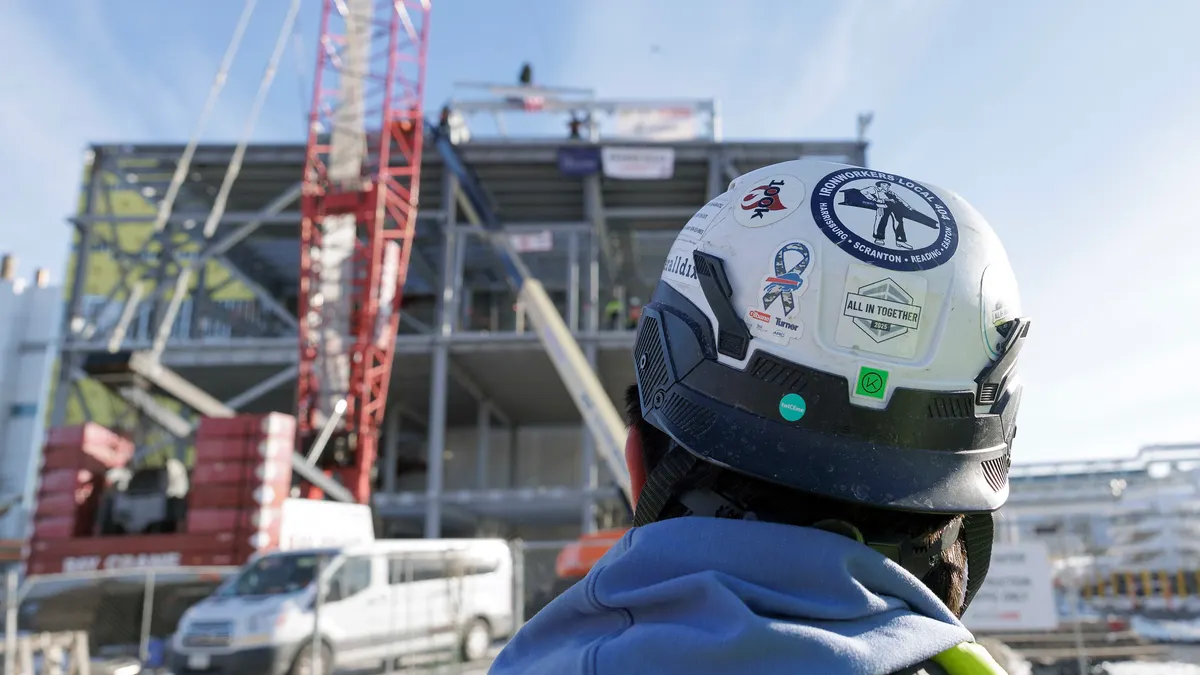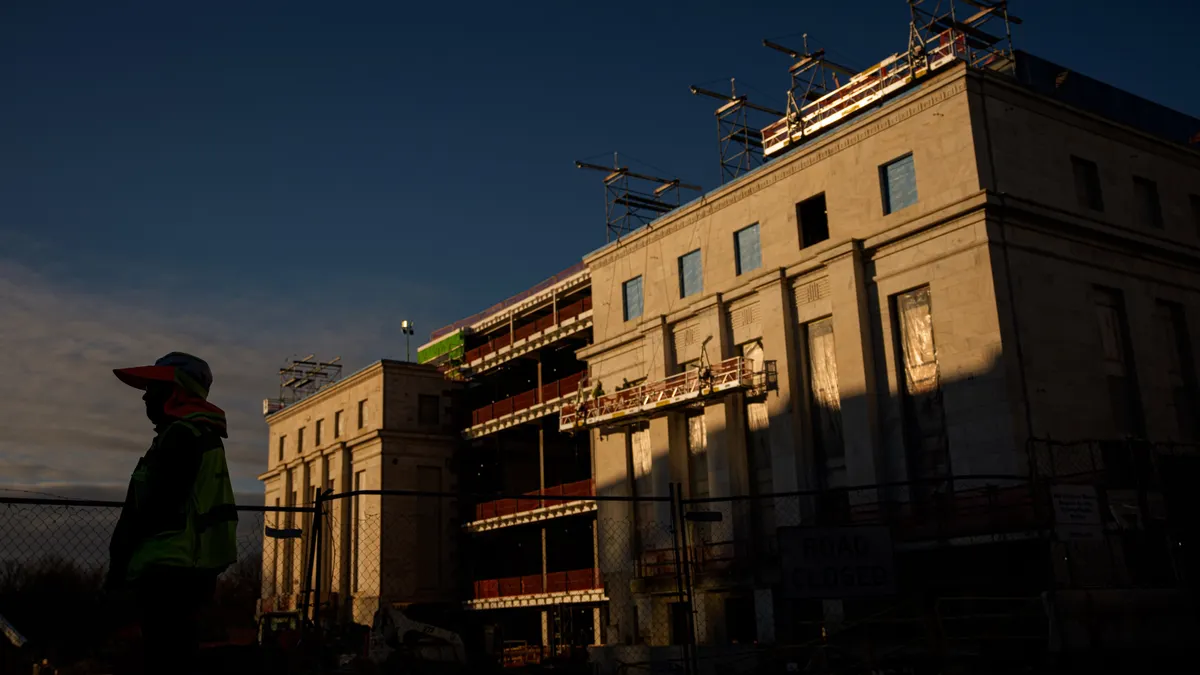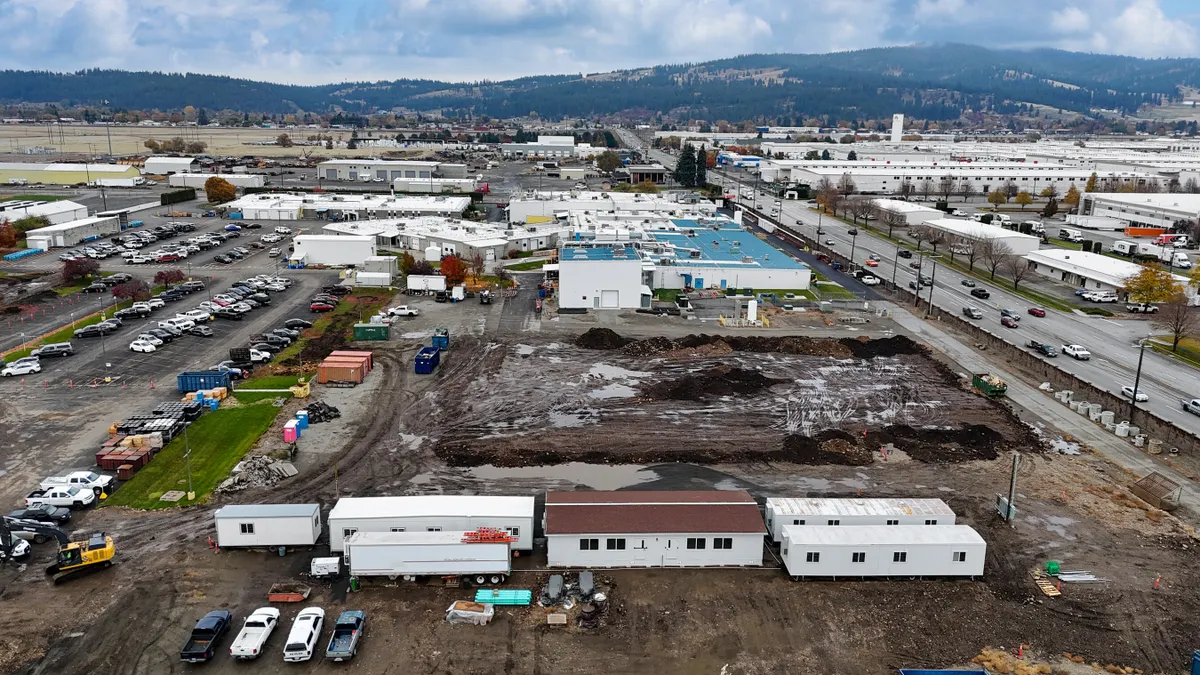Editor's note: This article is part of Construction Dive's 50 States of Construction series, in which we talk with industry leaders across the U.S. about the business conditions in their market.
Boston's historical significance as one of the key centers during the early days of the formation of the U.S. is evident throughout the city. However, the historical nature of those buildings can throw additional challenges into the already-complex projects that construction companies are tackling in the area.
Across Massachusetts, construction activity is strong, and not just in the historical renovation space, according to Todd McCabe, vice president of project services for Consigli Construction, one of the state's largest contractors. The state's higher education system and job market are attracting younger people who, McCabe emphasized, tend to stay there.
Construction Dive spoke with McCabe about the complexities of working on historical projects, the challenge of accelerated project schedules and his forecast for demand in Massachusetts in the coming years.
Editor's note: This interview has been edited and condensed.
How do you think the Massachusetts construction industry differs from that of other markets?
MCCABE: What sets Massachusetts apart is the history here. It's a hub of historical restoration and a hub of life science and healthcare. Also, there is the sophistication and specific project needs that those entities carry with them. Boston’s been around for a long time. It’s not your run-of-the-mill area where you can take for granted logistics.
Within the state, which market sectors are seeing the strongest performance right now?
MCCABE: There are kind of two economies in Massachusetts. There’s this Boston and Cambridge economy that’s seeing a big boom in housing development, in academic construction, in healthcare and in some life science projects. Within Cambridge alone, we’re working on three different projects for Harvard University. Outside of that Boston–Cambridge market, you’re seeing a strong market across the board, just not as hot as it is in Boston.
Why is that?
MCCABE: It's the draw to the major city vs. being out in the suburbs. Boston’s a great city and has a remarkable higher-education system. People come to Boston to learn, and most stay. We attract a remarkable group of people who live and work within the city, so we need to meet that demand.
How would you describe the labor market right now?
MCCABE: I don’t think there’s a real shortage in people; there’s a shortage in skilled people. That’s from the craftsmen all the way up to the project-level personnel. We all learned our lessons back in 2008 and 2009 and started to run more Lean. With the amount of work out there, it’s requiring people to be a bit more selective in who they choose and what projects they work on. The workforce is getting older, and less and less I see younger people wanting to get into the trades. There’s definitely an issue blossoming there. We’re expanding our net to attract people to Consigli just to get the people we need to run the jobs we have. We’re attending colleges and career fairs well beyond what we did 10 years ago.
What other challenges is Consigli facing in the marketplace?
MCCABE: A real challenge that I see on my jobs is owner expectations. Construction is getting more sophisticated, projects are getting more complex, and the want for those projects to be completed quickly is increasing — meaning we’re being given less time to do more work. I see the challenge there from design to construction, and it’s putting a great amount of risk on the teams that are designing and building those projects. How do you get different groups with different desired wants and outcomes to work as a team in that environment? We don’t have the luxury of time on our side in a quick construction schedule.
We’ve always been in the market for what we call 'summer slammers,' which focus in the academic world, as the time to renovate a school or do something on a campus is when the students aren’t there. We incorporate a lot of Lean initiatives into those projects, have our subcontractors on early and effectively plan the project before we build it on site. Now we’re taking some of those lessons learned and applying them to these larger projects that aren’t necessarily 'summer slammers' but have that significant construction pace associated with them in trying to get those projects built faster.
Five years ago, we were working at a pace of $1 million to maybe $1.5 million [in value of work put] in place every month as a very quick pace. Now we’re seeing projects where you need to put $4 million to $6 million in place to keep up the pace. That’s more people, more management and pressure on architects, designers and owners to answer more quickly.
Could the trend of accelerated project schedules soon reach a tipping point?
MCCABE: I think it has to. There’s only so much labor and so much material you can put in place in a certain timeframe. We’re always looking for ways to do things better and more efficiently, but at the end of the day, it’s going to come down to the number of people you can put in a certain area. We haven’t reached that tipping point yet, but I would imagine we’re getting pretty close to it.
How do new contract methods come into play with that faster schedule?
MCCABE: The change in contract methods is really a result of demand. People are looking for better ways to provide the end result. Lean, collaborative contract approaches and integrated project delivery are very big in the construction marketplace today. It’s helping the overall process. We spend a lot of time during planning to try and figure out how we can incorporate prefabrication into our construction projects.
Do you expect prefabrication to play a role in more projects going forward?
MCCABE: I do. We’re finding prefabrication more successful right now on some of our healthcare projects and some of our larger new projects. It becomes difficult for some of the renovations. We’re learning things every day on these projects that help us do more offsite and track material offsite. We’re understanding deliveries better and incorporating technology that helps us, at the end of the day, build a better building in a shorter timeframe.
You mentioned the unique nature of working on historical buildings. How does that affect how you tackle projects?
MCCABE: We’re a fourth-generation company that started in 1905 by a couple of masons. Historical restoration is something that has helped us become who we are. We’re always looking for those types of projects where we can incorporate what we do best and what we hold as a real characteristic of our company. It adds a complexity to the work.
Because Boston is such a historical place, it’s not like we’re building new buildings every day. On some of the academic institutions, it’s more renovation and restoration than building new. Those projects carry with them a high level of complexity and oversight from some of the historical groups within Cambridge, within Boston and within the other towns around the commonwealth.
Does that complexity add to the project timeline?
MCCABE: It does. It forces us to come up with solutions that balance schedule with the complexities associated with the restoration work. We have to find ways to work within those timeframes and get it done. Sometimes that’s more people, sometimes it’s a different approach in how we restore something. It just depends on what the challenge is.
Are you using new technologies to assist in that process?
MCCABE: From a restoration standpoint, we’re using a lot of BIM to create models and using virtual tools to help us understand the innate challenges of the restoration work. We work through preconstruction to help create those plans so we’re not caught during construction without an understanding of what we need to do.
Do you expect strong demand to continue in Massachusetts in the next few years?
MCCABE: We’re always looking a few years out. It’s inevitable that there’s going to be a downturn in the market. For us, we have a very good backlog in 2017, so we’re focusing business development in 2018 and 2019, which is a good position to be in. We’re a very diversified company; we don’t put too many eggs in one basket. If there is a downturn, it wouldn’t greatly impact us. Part of being successful is being able to diversify. We’re not looking for that one big project to get our name on.
What opportunities in the market are you most excited about?
MCCABE: A real exciting opportunity for us is life sciences and healthcare. We’ve been a player in that marketplace for a long time, and we just see that market — whether there’s a recession or downturn — as one that is strong and expanding not only in Boston and Cambridge, but into the suburbs. The academic realm is one that continues to keep me excited. More and more higher education institutions — private schools and public schools — have very large and complex projects on the horizon.



















